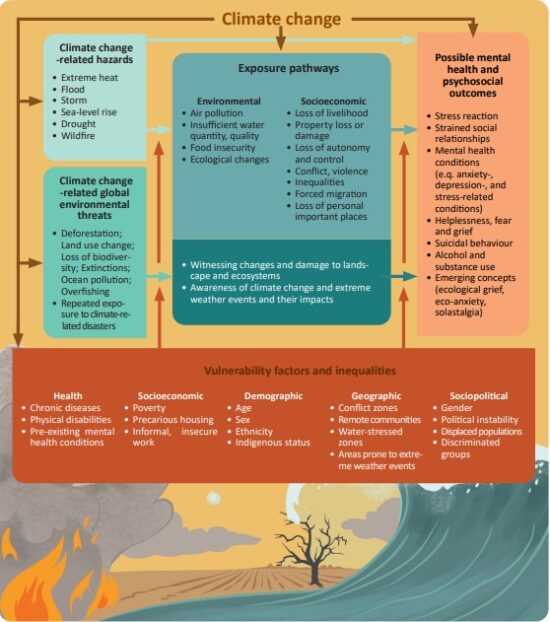The World Health Organization (WHO) sees climate change as a rising threat to the mental health and wellbeing of the economically disadvantaged, vulnerable seniors and youth. Because climate change impacts fall more on the poor than on the rich, so too does it disproportionately have a similar outcome creating increasing mental health burdens on a growing number of the world’s population.
Dévora Kestel, Director of the Department of Mental Health and Substance Abuse at the WHO states, “The impact of climate change is compounding the already extremely challenging situation for mental health and mental health services globally. Nearly 1 billion people are living with mental health conditions, yet in low- and middle-income countries, 3 out of 4 do not have access to needed services.”
What is the definition of good mental health? The WHO describes it as “a state of well-being in which every individual realizes his or her potential, can cope with the stresses of life, can work productively and fruitfully and can make a contribution to her or his community.”
Much of the focus of governments related to climate change deal with the physical support that can be given to citizens usually after the fact. A hurricane, tornado, or other extreme weather event brings out emergency services and programs focused on rebuilding, the hardening the existing infrastructure, and other adaptation strategies. But when a once-in-a-century flood becomes a decadal event, and people lose material things, most rich countries have programs to rebuild. They can handle physical damage because they have the means.
In poorer countries, there is a less robust physical response to climate change and extreme weather. There are fewer programs and less money to recover and rebuild what was lost.
In rich countries, health infrastructure and emergency services can deal with the physical trauma of these climate events. In poor countries, the health infrastructure is more challenged.
But in the case of both rich and poor countries, mental well-being in the face of climate change is poorly handled. Whether we are talking about treating post-traumatic stress disorder (PTSD), depression, anxiety and other emotional distress caused by the existential crisis of climate change, it appears governments are unprepared.
The WHO notes the reasons why we are deficient in addressing mental health globally. These include:
- an estimated one billion today are living with mental health disorders.
- the median number of mental health workers per 100,000 population globally is 13.
- government health budgets allocate only 2% to mental health.
- the money spent on mental health today is close to $1 trillion.
These numbers don’t take into consideration climate change impacts in the future.
How are mental health and climate change linked? The following diagram describes the interrelationship between mental well-being and our changing climate.

The effect of climate change on mental well-being can be both direct and indirect. There are both short and long-term risks. Extreme weather events can cause a cascade of mental health challenges. Vector-borne disease spread adds even more stress. Food and freshwater insecurity can lead to disease outbreaks, malnutrition, and an increased mental health burden.
In poor countries where populations are largely dependent on local food production to ensure physical survival, and among indigenous populations who harmonize their lives with the natural environment, climate change can be profound even if the initial impact is subtle. Over time, however, climate change alters the conditions putting those most vulnerable into an increasingly precarious state which affects both physical and mental well-being. And among youth who feel unempowered in the face of climate change inaction by those who are older and exert authority, mental wellness is being destabilized.
Examples of mental health impacts include:
1. Stress reactions
• Climate-related hazards lead to intense emotional suffering.
• Most experience distress after an emergency but can cope effectively when basic needs are met and security and safety are restored.
2. Stress-related physical health problems
• Stress can lower immune system responses, and increase vulnerability to air pollution and water-borne diseases.
• Chronic distress can cause sleep disorders which can influence physical and psychosocial well-being.
• Psychological stress can increase the risk of developing cardiovascular and autoimmune diseases and cancer.
3. Mental health conditions
• Depressive, anxiety and stress-related conditions, have been reported following extreme weather events.
4. Strained social relationships
• Climate-related hazards strain interpersonal relations and lead to intimate partner violence.
• Psychosocial impacts include family separation and disconnection from social support systems such as children being temporarily relocated and required to attend another school or miss school.
5. Helplessness, fear, and grief
• Witnessing the creeping impact of climate change can lead to worries about the future, along with feelings of helplessness and distress.
• Some experience feelings of loss, helplessness and frustration because they feel unable to stop climate change or make a difference.
• Many young people report feeling impairing distress and a sense of betrayal and mistrust of government in the face of climate inaction.
6. Increased risk of suicidal behaviour
• Risk of suicide may be higher among those who have experienced repetitive or severe hazards.
• Rising ambient temperatures have also been linked to increased suicide rates in many countries.
7. Loss of personally important places
• When climate change threatens a local environment it creates feelings of loss for the affected population including a sense of desolation.
• Changes to the physical environment, particularly, home environments can lead to emotional distress and disorientation. Examples include people losing homes to rising sea levels or land becoming unsuitable for farming practices or unable to support food crops because of long-term drought. Those affected experience emotional distress and a sense of helplessness.
• Losing a home to a climate change event creates a loss of continuity and belonging and impacts personal self-worth and identity.
8. Loss of autonomy and control
• Extreme climate impacts cause people to lose the ability to meet basic needs. Their sense of personal autonomy and control is shaken.
9. Pollution
• Pollution whether air, water, or land, is associated with climate change and increased risk to the mental well-being of unborn children whose mothers are exposed to it during pregnancy.
In Part Two we will look at approaches and recommendations for governments to implement to address mental and psychosocial impacts from climate change.









